
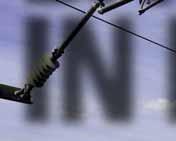















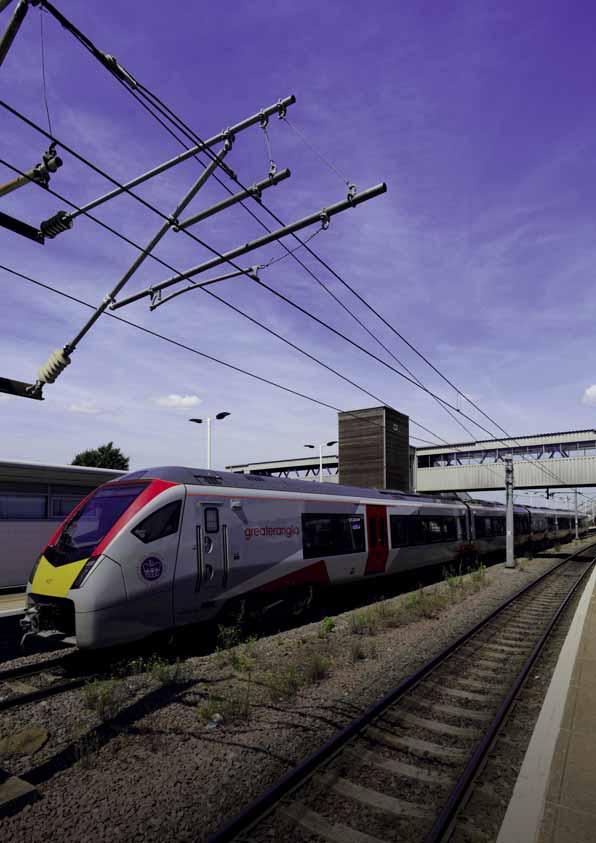



















TUCCongress delegates meeting in Brighton unanimously backed RMT calls for a summit with the London mayor to discuss the chaos in London transport caused by overwork and understaffing, growing violence and ingrained outsourcing.
This union has already taken industrial action to highlight the devastating impact of these issues on our members, and they are now demanding political solutions to tackle them by those in power.
Any solutions require a real determination to deal with the root causes of these disputes including underfunding, contracting out and a refusal to negotiate seriously in the face of an increasingly violent and unstable society.
What workers in London face are also being experienced by transport workers up and down the country.
A recent House of Commons report on the state of the bus industry has only confirmed what bus workers and passengers have known for years –decades of deregulation and disinvestment have slashed services and driven up fares while frontline staff face low pay and job insecurity.
Meanwhile in its recent report, the Chamber of Shipping has written off UK seafarers as ‘uncompetitive’ whilst demanding easier access to cheap foreign labour on ferry and offshore energy routes.
The transport sector is also plagued by the scourge of outsourcing which condemns workers into systematically low paid jobs, with none of the benefits which those who work beside them enjoy after fighting long and hard for them.
This union is calling on Labour to implement its manifesto promises and bring workers in-house.
We have to say loudly, outsourcing on our railways has always been a racket.
Private firms are cashing in while cleaners, security staff and track workers, among others, are left

struggling, often on low pay, insecure contracts and unsafe conditions.
It’s totally indefensible and a waste of taxpayers’ money.
That is why the trade union movement needs to demand an end to the chaos of the wild west free market and start the process of organising society for the benefit of all, not just the billionaires.
That means demanding sectoral collective bargaining and real trade union rights at the workplace, where it matters.
Working people in Britain feel alienated and disillusioned. They are right to feel that way — workers have been betrayed time and again.
The past four decades have witnessed a deliberate dismantling of working-class security through the implementation of neoliberal economics and rapacious globalisation.
The privatisation of public services, the offshoring of our manufacturing base and the outsourcing of what was left has diverted wealth upward, leaving communities reliant on crumbling public services and insecure work.
The richest one per cent captured 44 per cent of all wealth growth since 1988, while public infrastructure faces a £200 billion investment gap.
But the solution to this is not more division, it is unity. The people we live beside and work beside are not our enemies, nor are they our competitors. They are our community.
We must fight alongside them in the workplace, in our towns and cities, to rebuild hope in this country. We must defeat this pernicious dog-eatdog corporate ideology that divides us.
In the face of chaos and resignation, it is time for the trade union movement to put forward a different vision. It is time for the organised society.
Eddie Dempsey
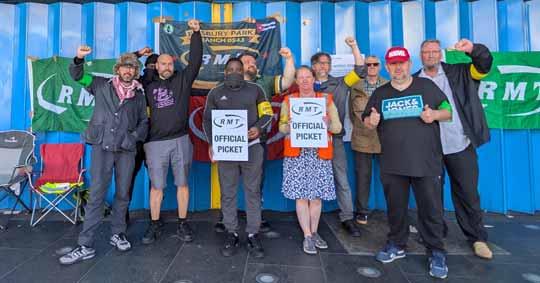
TUC delegates meeting in Brighton unanimously backed RMT calls on London Mayor Sadiq Khan to attend a summit to find resolutions to the tube strikes and other escalating disputes in the capital.
RMT members took highly successful rolling strike action across the network in early September, with different grades taking industrial action at differing times.
The strikes came after management refused to engage seriously with union demands on pay, fatigue management, extreme shift patterns and a reduction in the working week, as well as failing to honour previous agreements made with staff.
In the same week, members took strike action on Docklands Lights Railway (DLR) operated by a private contract let by Transport for London (TfL), together with another strike by DLR sub-contracted cleaners.
RMT has also declared a dispute with outsourcing giant ABM after the company failed to improve its derisory offer to
tube cleaners working on its contract.
Despite repeated calls for a fair pay settlement, ABM management has refused to budge and have made no offer whatsoever on sick pay, leaving cleaners with no protection when they fall ill.
Across TfL subsidiary companies and contracts there is a breakdown in industrial relations on public transport fuelled by TfL’s failure to meaningfully address workers concerns in an increasingly pressurised workplace.
RMT members across the London network are coping with a massive increase in passengers with high levels of assaults, stress and fatigue.
The Greater London Authority Transport Committee has even called for TfL to reconsider its approach to staffing stations to improve staff safety.
TUC Congress delegates were also dismayed that on some contracts presided over by TFL there is no company sick pay, poverty wages and the use of zero-hour contracts.

Delegates were also appalled to learn that Elizabeth Line Concession Operator had announced that it planned to close all its ticket offices by August 2027.
The proposal comes just months after a mass outcry forced the previous government to abandon similar ticket office closure plans across the rail network.
The information only came to light when the union was given sight of unredacted documents signalling that the ticket offices would be earmarked for closure.
Elizabeth line services are operated by GTS Rail Operations under a TFL concession.
Speaking at TUC Congress, RMT general secretary Eddie Dempsey told delegates that he had a message for the mayor.
“Stop going on social media, invite us to a meeting to have a discussion, because I want to know what is going on in London,” he said.
He warned of more strike action if there was no resolution but pointed out that members did not want to be in this position.
“We take no pleasure in causing disruption, but we make no apology for fighting for our members. So, if the mayor has any sense, he will reach out to us,” he said.
Following swift union intervention an RMT member is now back at work after being unfairly dismissed by ABM Facility Services UK.
The union pointed out that the case exposed a worrying lack of understanding by management regarding drug and alcohol testing policies and procedures, which nearly cost a dedicated worker her livelihood.
Tinka, a worker on the Transport for London (TfL) contract, was subjected to a random on-site drug and alcohol test which showed a ‘non-negative’ result.
As per standard procedure, a final laboratory analysis was conducted by the testing company which confirmed that the test was negative for all and any illegal drugs.
The word negative is repeated seven times across the test result.
However, it seems ABM didn’t know how to correctly read the test result and so proceeded with a disciplinary hearing and three days later sacked Tinka stating she had been terminated for “being under the influence or incapable due to the consumption of alcohol or through the use of illegal drugs/medication”.
This of course caused great distress, not least because there was no sense in it at all as the lab test result was negative.
ABM appears to have misinterpreted the lab results, asserting that the mere ‘presence’ of substances constituted a serious breach of their zero-tolerance policy for safety-critical roles under the TfL contract.
The company failed to understand that whilst the test showed a minimum threshold this had nothing to do with the actual result but rather is a figure that each test shows.
The union immediately challenged the decision, arguing that the dismissal was founded on a fundamental misunderstanding of the existing test results and the company’s own policy.
RMT reps Shengyul Sali and Peter North, along with London Transport regional organiser Jared Wood, highlighted to ABM that the final laboratory analysis clearly indicated that the test result was negative meaning there was no case to answer.
The union’s persistent questioning forced ABM to seek further clarification from the testing companysomething which should happen from the start when the employer is unsure of what technical evidence means.
As a result, the appeal outcome letter reversed the original decision, and the member was reinstated with

immediate effect and received back pay for the period that she was unjustly dismissed.
The company also acknowledged that the initial screening result may have caused concern but admitted that the confirmed negative result did not warrant disciplinary action.
Tinka, who has worked diligently for ABM for many years, thanked the union for everything you have done for me.
“I now understand why my decision to join RMT five years ago was so important.
“I look forward to
explaining to my colleagues at ABM the importance of being in the union too,” she said.
RMT general secretary Eddie Dempsey said that without RMT’s intervention, a worker with a negative test result would have remained unjustly dismissed due to a clear error in interpreting a standard drug test report.
“This case serves as a powerful reminder of the vital protection that RMT membership provides against managerial overreach and misinterpretation of company policy,” he said.
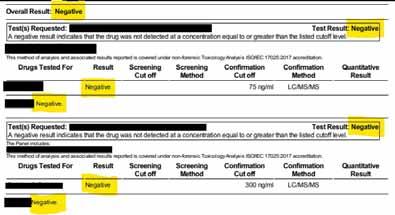
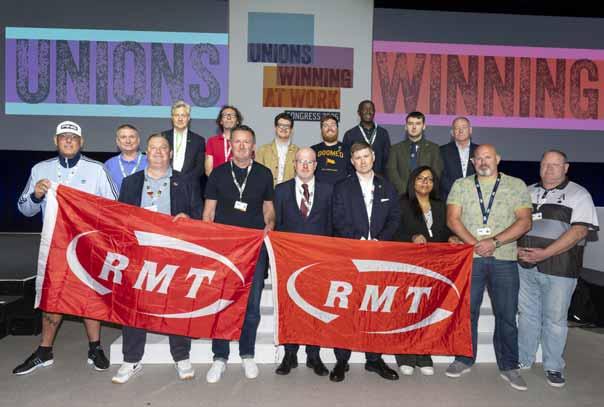
RMT put its London Underground dispute, the campaign against assaults and for the insourcing of rail workers on the agenda at this year’s TUC Congress in Brighton.
Addressing delegates, RMT general secretary Eddie Dempsey brought into sharp focus the growing number of assaults and incidents of abuse on the network.
Moving the RMT motion in a powerful speech he said:
“Members of my union, reps and people I know have been stabbed or threatened with being stabbed.
“Our members have reported a sharp rise in violent attacks of all kinds and an escalation of aggression in those assaults”.
While paying tribute to Jorge Ortega who was killed at work in Iford station last year, he pointed out that there was a growing consensus for the need for action, adding:
“We’re still waiting for the government to bring forward legislation to make it a specific offence to assault a transport worker.
“So, we are saying to the government and industry, we’ve got to have a properly staffed railway, a guard on every train, we have got to have station staff and BTP in force to look after people.
“And if we can’t get those things, our members have made it clear that they are
prepared to take industrial action,” he said to applause.
RMT delegate Rotimi Ajayi condemned the government’s sudden changes to immigration rules for skilled workers which would leave up to 50 of RMT members working on London Underground face losing their work.
He said that the new rules were pushed through without notice or proper parliamentary scrutiny. The union’s campaign
continued with a protest outside the Home Office.
First-time RMT delegate Eli Edwards highlighted the urgent need to recruit and organise young workers, through use of effective digital and modern campaigning techniques.
“Young workers, without union protection or under collective bargaining agreements are more likely to face low pay, poor working conditions, insecure contracts, and face the brunt of experimental workplace reforms that aim to make people work more for less,” he said.
RMT president George Welch welcomed the move to bring train operating companies into public ownership under Great British Railways (GBR) and reaffirmed support for expanding it to absorb open access and freight operations.
“Rail nationalisation should create a situation where staff regardless of their role, should
all receive good pay and decent terms and conditions,” he said.
RMT delegate Dave Gwatkin outlined the crisis facing UK ratings in the maritime sector.
“Over the last 24 years, 14,600 UK cadets have been trained on Tonnage Tax ships but only 115 were UK ratings. Shipowners have benefitted to the tune of nearly £3 billion in relief from corporation tax under the Tonnage Tax,” he said.
Backing the Maritime Skills Commission’s calls to change course, he added: “Supporting Ratings training is in the interests of our working-class communities and the national security needs of an island nation”.
First-time speaker RMT delegate Wayne Barnett argued for a proper rail freight strategy including nationalisation.
“Transport is the UK’s largest emitter of greenhouse gases – and passenger cars,


vans and lorries account for the vast bulk of domestic transport emissions. Investing in rail freight does not just cut emissions – it increases economic growth,” he said.
RMT delegate Alex Gordon also warned Congress against government priorities that funnel public money into weapons instead of communities.
“Our own government uses the language of hard choices to explain cuts to welfare, attacks on disabled people, and the Waspi women and working families while lavishing eye watering sums of public money on arms spending with a false promise of reviving Britain’s manufacturing industries,” he said.
The motion backed by Congress after a card vote condemned rearmament as no foundation for national renewal and pledged to reverse support for increased defence spending. Instead, it committed the movement to
prioritising welfare, wages, and investment in public services.
RMT also backed a call on Labour to adopt a bold economic programme including extending mandatory sectoral collective bargaining and delivering the biggest wave of insourcing in a generation.
Eddie Dempsey outlined how collective bargaining coverage had dropped drastically across the economy.
“It was political decisions that took away our right to solidarity strike action which made our strike action less effective and made our ability to organise less effective,” he said.
The union also held a packed meeting on outsourcing with cleaner and union rep Bella Fashola who recently met with Labour ministers as part of a TUC event, urging them to follow through on election manifesto promises to insource rail workers.


The union is developing effective strategies to build membership in docks, ports and waterways.
Historically this area has been neglected due to some companies being viewed as ‘general grades’ whilst others were viewed as ‘maritime grades’ so ownership in terms of organising was often blurred.
Following a change to unions rules all workers operating within docks, ports and waterways are now categorised as maritime and this requires an organising strategy that gives workers within this sector visibility, campaigning objectives and structural representation.
RMT national secretary Darren Procter said that any organising campaign must include correct data, identifying industrial and health and safety reps, training and conducting a survey to see what members in this sector see as priorities.
“Being in a union should be more than an insurance policy and we need to instigate debate and discussion around terms and conditions of
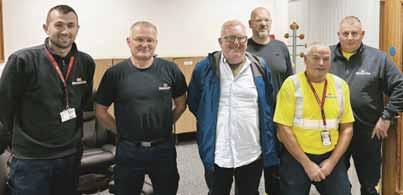
employment or your objectives as a workforce.
“That means developing networks of activists that are connected to each other, discussing challenges within the workplace and presenting quality arguments to improve terms and conditions.
“We have identified that we have 20 health and safety reps that need training as well as vacancies within some workplaces and this has got be a key focus area within this sector going forward.
“We must embark on a journey of improvements that
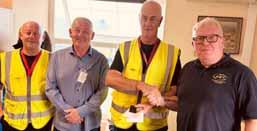
includes key principles of effective industrial and health and safety reps in every workplace and to be ballot ready and organised to counter attacks on terms and conditions of employment or workplace injustice.
To ensure that we are organised we need members in every workplace to discuss if we meet those key principles and if not, what are we going to do about it, because remaining unorganised is not an option.
“To be organised within your workplace requires
Darren Procter visited the port of Holyhead to present a 50-year membership medal to Hywel Gray who works for Stena Line as a port worker. He was joined by Holyhead No1 branch Secretary and NEC member Steve Conway. Hywel was presented with a 50-year medal, a signed letter
members to identify workplace leaders capable of being a representative with the relevant support and training,” he said.
The union is developing a clear focus on becoming better organised in this important sector and to encourage greater trade union activism.
Hopefully this article will trigger debate and discussion within the workplaces of those within the sector and so RMT can put focus on your aspirations at work.
from the general secretary and a voucher for a meal in a local restaurant by the branch in recognition of his loyal support to the union for over 50 years.
Also pictured is Geraint Jones who was presented with a 10-year membership award and is employed by Securitas in the port.


Harwich maritime branch secretary Stuart Morrison opened the first meeting of the new branch which covers seafarers, dockers, security workers and those working in the renewables industry such as wind farms.
He said that it had been a long-term aim to create an RMT branch that covered all grades working at the port which added up to around 200 workers.
He thanked RMT regional organiser Kathy Mazur and RMT national secretary Darren Procter for their assistance in creating the industrial unity required to represent all workers at Harwich
international port.
This includes workers at Stena Brittanica, Subsea, OCS and at Mitie security as well as the RRS Sir David Attenborough, one of the most advanced polar research ships in the world operated by the British Antarctic Survey out of Harwich (see page 21).
He also pointed out that a member of the branch, Peter Martin, had recently attended the union’s annual general meeting in Glasgow cementing the branch into the work of the union.
Darren Procter said that the union was more than an insurance policy if you got into trouble at work but also a

vehicle to improve conditions at work in a real way across all grades of maritime worker.
“Whether you are on ship or on shore we need to build that unity and pull together to defend and improve your conditions.
“That means identifying key issues to campaign around, engaging with the employer and, if necessary, write to your NEC and demand action,” he said.
Branch members identified some priorities during the debate including the growing problem of aggressive passengers on the car decks, particularly from those who had been drinking.

Other issues included addressing mental health issues and other health and safety matters to be taken up.
Darren presented members with long service awards starting with long-serving Harwich Shipping branch secretary Stuart Morrison who received his 40-year badge.
“Stuart has been a stalwart of this branch for many years and it is in no small part down to his work that we have such a unified maritime branch today,” he said.
He also presented Steve Catamole with his 25-year badge and David Wilkinson with his 10-year badge.
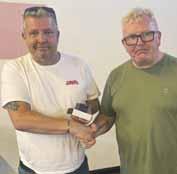
RMT has demanded urgent and decisive action from Govia Thameslink Railway (GTR) to adequately respond to a serious rise in assaults and anti-social behaviour affecting staff.
Union members are reporting near-daily incidents involving physical assault, spitting, verbal abuse, threats, and intimidation.
This surge in aggressive behaviour is putting the physical and mental wellbeing of frontline rail workers at risk, with staff increasingly required to carry out their duties in fear.
Despite repeated calls for meaningful intervention, GTR has so far failed to introduce adequate safety measures.
The union has outlined three immediate priorities:
• The deployment of additional staff and security presence at key stations and onboard services
• A visible and consistent enforcement operation to deter violence and antisocial conduct
• A company-wide safety plan developed in consultation with staff representatives, aimed at ensuring a safe working environment for all employees.
RMT general secretary Eddie Dempsey said that the level of violence on GTR’s Southern and Gatwick Express services has reached a crisis point.
“Our members are being assaulted, threatened, and abused at work and the
company is not doing enough to stop it.
“GTR must act without delay to protect its staff and passengers. If the company continues to ignore this situation, the union will be forced to consider all options, including industrial action. We will not accept a working environment where staff are left exposed to violence,” he said.
The union’s Action on Assaults campaign continues to highlight the need for a zero-tolerance approach to violence across the rail network.
It calls for improved staffing levels, better reporting mechanisms, and robust support for staff affected by abuse.
The testimony received from members backs up earlier RMT research where it surveyed 6,000 members across rail, bus, metro, maritime and underground sectors, finding that 63 per cent experienced workplace violence in the past year, and over 85 per cent of them were assaulted multiple times.
The majority of cases involved verbal abuse, with many also facing threats, physical assaults, and harassment including racist and sexist abuse.
Notably, over 60 per cent of the most serious incidents occurred during lone working.
RMT regional organiser John Parsons said that the problems on these routes were not isolated incidents but part of a sustained pattern.
“This isn’t just a spike - it’s an ongoing issue that’s been raised time and again.
“Our members are on the front line, often working alone or in understaffed environments, and facing unacceptable levels of risk.

“The company cannot continue to rely on posters and campaigns while failing to provide basic protection and visible enforcement. We need real, practical action, not warm words,” he said.
He also acknowledged that the media blitz by the union had had the desired effect on management with further talks occurring with a view to putting in place measures that will help members feel safer at work.
“Many of our members are showing up for work knowing they’re likely to be threatened or abused during their shift.
“It’s taking a serious toll on morale and mental health. No one should be asked to work under those conditions,” he said.
Figures from earlier this year highlight similar trends elsewhere in the Southern region, illustrating the broader scale of the issue.
Rail staff in Sussex are reportedly being assaulted more than once per week, with over 60 staff members assaulted on board trains in a recent period according to a British Transport Police (BTP) Freedom of Information request.
In one case, an on-board supervisor at Billingshurst
suspected fare dodger, sustaining a fractured neck, a chipped tooth, and requiring stitches to the lip.
Frontline rail workers face persistent violence, even outside the GTR network which is why RMT’s Action Against Assaults campaign nationally will press for urgent changes on two fronts.
The union is demanding action from employers to end lone working, reduce latenight exposure, and ensure proper staffing and safety protocols.
The union will also support health and safety reps to challenge unsafe conditions through workplace structures and push for system-wide action via industry bodies such as Great British Railways.
RMT is calling for a standalone criminal offence for abusing or assaulting public transport workers. The campaign will also build alliances with NGOs, women’s groups, and disability advocates to raise wider public awareness and support.
Mr Dempsey added: “With cuts to staffing and police presence continuing, too many workers are being left at risk. Action Against Assaults sends a clear message that protecting public transport workers is urgent, and it is a key priority for the union”.

RMT has condemned planned cuts to the British Transport Police (BTP) as a serious threat to the safety of rail staff, particularly those working alone on trains and at stations.
The £8.5 million funding shortfall facing the BTP this year could result in the closure of police stations and the loss of around 600 posts including 200 filled roles.
As a result of the funding shortfall, 13 BTP stations could close by April next year and some have already closed. Those under threat included Carmarthen, Grimsby, Lancaster, Middlesborough, Southport, Stoke, Taunton, Dumbarton, Dundee, Perth, Bromley, Gatwick and Richmond.
The BTP’s workplace violence coordination unit which is tasked with addressing assaults and abuse of staff, is being disbanded entirely, with its work either
ending or handed off to other departments.
At the same time the BTP is forecasting a nearly 30 per cent rise in crime on the railway between March 2025 and next March.
The cuts are also expected to cause 250,000 additional delay minutes, adding cost and disruption to services yet the £8.5 million shortfall equals just 0.03 per cent of the railway’s total annual expenditure.
The union said that all this would leave frontline rail staff exposed to rising levels of violence, harassment, and anti-social behaviour, with reduced or non-existent police response on much of the network.
The impact is most acute for staff at stations and
onboard trains, where RMT members already report regular verbal abuse, threats, and physical assault.
Planned cuts in Scotland are so severe that large swathes of the country will have little to no BTP coverage whatsoever.
RMT general secretary Eddie Dempsey said that the cuts will severely impact the safety of rail workers and the travelling public.
“Station staff and train crews are being left to deal with violent and abusive passengers without adequate BTP support, often late at night, in isolated locations, and with no backup.
“BTP’s own figures show a sharp rise in crime across the network, yet the response is to slash officer numbers, close
stations, and disband the very unit dealing with workplace violence.
“The scheduled closures in Scotland are particularly worrying with large parts of the country having no nearby BTP support.
“There was a time when BTP officers would patrol stations and trains regularly providing a sense of security for staff and passengers. Now our members report that BTP will only attend the most serious of emergencies.
“Our union opposes these reckless cuts and demands immediate action to restore BTP staffing, reinstate protection for rail workers, and ensure our members can do their jobs without fear of abuse or attack,” he said.
“BTP’s own figures show a sharp rise in crime across the network, yet the response is to slash officer numbers, close stations and disband the very unit dealing with workplace violence”
The London Assembly Transport Committee has backed calls for urgent action by Transport for London on fare evasion and staff safety to tackle the rising levels of violence against frontline transport workers.
RMT welcomed the fact that the committee linked fare evasion with staff assaults and highlighted the
urgent need for more frontline staff, properly resourced enforcement and serious consequences for those who attack transport workers at work.
RMT general secretary Eddie Dempsey said that tackling fare evasion was the biggest trigger for staff assaults and welcomed the London Assembly Transport Committee’s call for more
frontline resources and real consequences for those who attack our members at work.
“We need to end lone working, increase staffing across the network, stop the dangerous cuts to the British Transport Police, and put in place stronger legal protections for transport workers who face violence just for doing their jobs.
“Our recent survey shows that 60 per cent of rail staff who have been assaulted were working alone at the time. That is simply unacceptable,” he said.
RMT is demanding an end to lone working on the rail and tube network and increased staffing at stations to ensure safety for workers and passengers.
CIRAS is a confidential safety hotline that listens to transport workers about safety concerns so that listening can lead to learning and action.
Speaking up about safety, health, or wellbeing concerns can be hard, but sharing them could keep yourself and others safe. Tell someone. You might not be sure exactly what the issue is, but if no one knows then they can’t investigate. The good news is there are different ways to raise concerns, including telling your RMT union rep. CIRAS, which stands for Confidential Incident Reporting and Analysis System, is there if you want to raise a concern in confidence. Using CIRAS means the company receiving your concern doesn’t know who you are. You can report concerns to CIRAS whether or not you’ve raised them to anyone before. You can also raise a concern through CIRAS for any company, not just your employer. Your concern will reach the right person.
If ways of working, your working environment, processes, or policies are risking people’s wellbeing, safety, or health, you can tell CIRAS. You can raise concerns about fatigue, training, unsafe practices, team culture, assets, infrastructure, and equipment, for example.
CIRAS doesn’t take concerns that identify a specific person. It’s also not suitable for raising concerns
where there’s an imminent risk of harm. Use more appropriate reporting channels instead for real-time safety concerns that need to be dealt with immediately.
You can raise a concern with CIRAS in different ways: - use the CIRAS reporting app, from the App Store and Google Play Store - fill in the form on the CIRAS website at www.ciras.org.uk/raise-aconcern
- call the reporting hotline on 0800 4 101 101
- or mail it to Freepost CIRAS.
The CIRAS team will arrange to speak to you on the phone at a time and date that suits you. They listen carefully and impartially, asking questions to ensure confidentiality.
The CIRAS report is based on your phone discussion, protecting your identity by removing any identifying details. It’s a comprehensive process so there’s no way for a company to identify you as the reporter. CIRAS shares its report with the company it’s for, which investigates and acts to improve safety based on the report information.
The company receiving a CIRAS report always responds to CIRAS. CIRAS shares this response with the reporter so that they know what’s happened as a result.
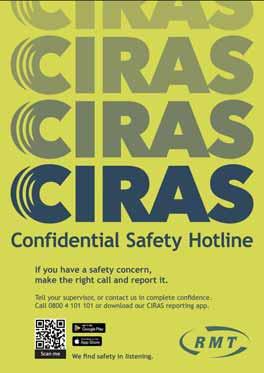
Now available: order printed CIRAS posters and flyers with the RMT logo for free from the CIRAS online shop (above). Search online for CIRAS shop or go to www.willsonshop.com/collections/ciras. You’ll find the RMT poster and flyer at the end of the page. To order click on the RMT item, add it to your basket and select how many to order. In the basket, use the code CIRMT1 in the space for a CIRAS membership number. You’ll then go to the checkout. The printed items will be posted to you completely free, no postage needed.
RMT members at CrossCountry from Edinburgh to Plymouth took two days of strike action recently following multiple breaches of agreements, inadequate staffing and management practices.
CrossCountry is also attempting to reverse the requirement for two Train Managers on double sets, threatening safety and jobs.
The company has failed to recruit the agreed number of Train Managers and is misusing catering staff in safety-critical roles. Management staff are also performing Guard duties without authorisation, undermining agreements.
Excessive payments to managers, reportedly up to £250 per train, are being made while frontline staff are

denied fair overtime rates. The company has not implemented agreed ticket scanning payments and continues to pay different rates for the same job.
RMT general secretary Eddie Dempsey said that CrossCountry was trying to wriggle out of agreements and block fair pay for our members.
“We will not accept that
and our members have been left with no choice but to take industrial action.
“Our members deserve proper recognition for the work they do, and we will campaign until they get it.
“We urge the employer and DfT to negotiate properly and help us reach a negotiated settlement,” he said.
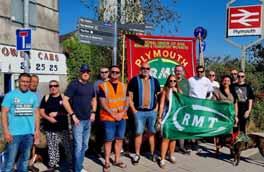
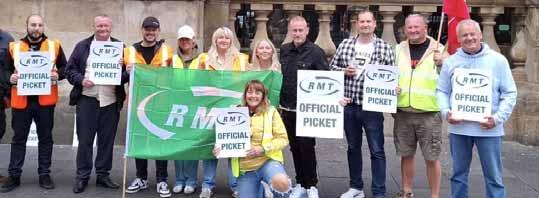
Members working at Transpennine Express have settled a long-running dispute over new technology payments.
Following extensive negotiations in this longrunning dispute over ticket
scanning, the company has agreed to a deal that is in line with other train operating companies.
The employer’s starting negotiating position had initially been to cut the commission payment on all
ticket sales back to four per cent from the agreed six per cent.
However, during discussions the union managed to negotiate a retention of the six per cent on all ticket sales, plus 2p on
every ticket scanned.
RMT general secretary Eddie Dempsey congratulated the negotiating team for progressing an agreement for the benefit of RMT members at TPE.

‘OUTSOURCING
Labour must deliver on ‘biggest wave of
in a generation’ promise
RMT’s campaign against rail outsourcing included a rally in Manchester calling on Labour to implement its manifesto promises and bring workers in-house.
Addressing the rally, RMT general secretary Eddie Dempsey said that “outsourcing on our railways is a racket.
“Private firms are cashing in while cleaners, security staff and track workers, among others, are left struggling, often on low pay, insecure contracts and unsafe conditions.
“We have overworked cleaners, for example, working while sick, as companies like Churchill hand millions to shareholders.
“It’s totally indefensible and a waste of taxpayers’ money,” he said.
Also addressing the rally, Salford Labour MP Rebecca Long Bailey said that outsourcing on our railways was inefficient, drains passenger revenue, drives down workers terms and conditions and wastes taxpayers’ money.
“Outsourced workers often fail to receive the same benefits as in-house employees, creating a divide within the workforce.
“I am proud to support RMT in its national campaign to end outsourcing on Britain’s railways,” she said.
RMT regional organiser Steve Shaw and North West TUC secretary Jay McKenna also exposed the ongoing structural issues in the rail industry regarding outsourcing at the rally.
In a recent report, the union warned that despite government plans create the new publicly owned body Great British Railways (GBR), a ‘hidden layer’ of contractors continues to profit from the exploitation of thousands of workers.
The report warned that such companies make profits by keeping workers on lowpaid, inferior or casual contracts, leaving them struggling to get by.
RMT argues that all rail jobs, from cleaning to catering, engineering to station services, should be
brought back in-house to reverse decades of outsourcing that have driven down pay, eroded conditions and undermined safety.
The union estimates that around £235 million flows out of Network Rail each year in subcontractors’ profits, with a further £130m going to outsourcing firms — about £400m in total.
RMT research also shows that despite the cost-of-living crisis and rising labour costs, contractors have preserved their margins by using contracts that pass extra expenses straight back to the government.
The union is also supporting an outsourced member of staff working for Churchill on Govia Thameslink Railway (GTR) who was reinstated after being sacked for speaking up about conditions, only to be dismissed again.
Eddie Dempsey said that this was not an isolated case.
“It’s part of a clear pattern of trade union victimisation, where raising a grievance or
talking to your union is met with disciplinary action, reassignment or dismissal
“It’s crucial that when Churchill’s contract expires, all members are brought back inhouse,” he said.
In a video message, he addressed Churchill cleaners calling for full support to their sacked rep.
“Our union is very clear: cleaners need to be brought back in-house.
“That was a promise made by this Labour government, who said at the last general election that we’re going to have the biggest wave of insourcing in a generation, and we want to hold them to account”.
He added that the union is “stepping up its campaigning, building membership strength and preparing ourselves for any collective action that we might have to take.
“We’ll continue to confront Churchill like we would any employee who treats our members in this disgraceful fashion.
“Outsourcing is inefficient as companies cut costs to win
bids at the expense of service quality, only to rebuild them later to protect profit margins,” he said.
The union recently created a media storm on the eve of c2c services in Essex coming back into public ownership exposing the fact the company still retained outsourced cleaners who will not reap the benefits of public ownership and direct employment.
Bidvest Noonan who oversees the contract for cleaning services on c2c left

members working in filthy and unsafe conditions. The company had not repaired a washing machine used to clean mops and cloths at the company’s East Ham depot in London, leaving it broken for two months.
As a result, cleaners were forced to wash soiled mops by hand and dry them in bin areas, raising serious hygiene concerns.
Stocks of protective gloves also ran out, leaving only medium sizes that don’t fit many staff – which breaches basic PPE standards and exposes cleaners to chemical

burns, infections, and contaminated waste.
At the Fenchurch Street break room shared by cleaning, c2c, and security staff, only four of the original eight chairs remain, forcing workers to stand after physically demanding shifts.
RMT regional organiser Kathy Mazur said that cleaners were still working in privatised conditions that would be unacceptable anywhere else.
“This is what outsourcing looks like with no accountability, cutting corners and a total disregard for basic safety, public ownership must

mean decent and proper standards.
“That starts with bringing cleaners and all outsourced workers in-house and treating them with the respect they deserve,” she said.
Under GBR, most passenger rail services are due to be renationalised as contracts reach the end of their minimum terms, with full transition by October 2027.
The union is campaigning against the assumption that outsourced cleaning contracts will remain in place despite the creation of GBR.

Members working on the Carlisle Support Services contract for Northern Trains, covering revenue protection and station gateline roles took 24-hour strike action recently.
Members voted overwhelmingly for action in a dispute over pay and
conditions after the company has refused to make an offer despite nine months of negotiations.
Members will also begin continuous action short of a strike by refusing to scan tickets or charge company equipment at home.
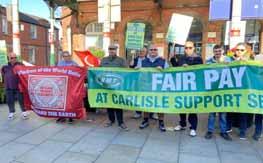
This action will disrupt ticket checks and gateline operations across the Northern network.
RMT general secretary Eddie Dempsey said that these workers did vital frontline work keeping stations safe and services running and they deserve respect and a fair pay
“This strike action will send a clear message to Carlisle Support Services that it is time to come back with a serious offer and ultimately take these workers back in house, directly employed by Northern,” he said.
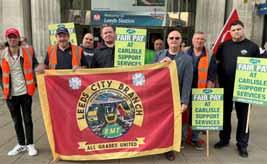
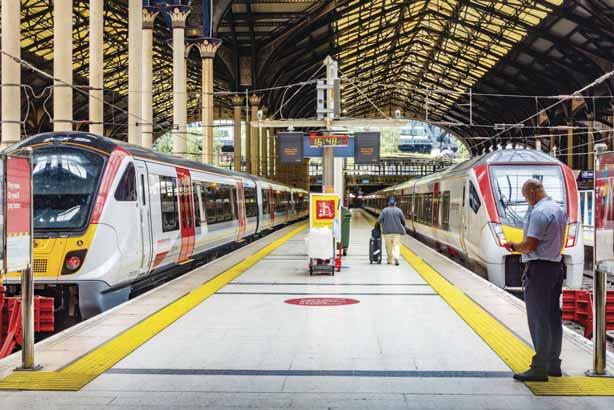

Greater Anglia will be brought back into public ownership from October 12 to become part of Great British Railways (GBR) in due course. This is part of the government's plan to phase out train operator contracts and take them in-house under GBR and reunite track and operations which were split up
under privatisation over 30 years ago.
GBR will be formally established with the passing of the forthcoming Railways Bill to absorb the functions of Network Rail, the Rail Delivery Group, the Department for Transport operator and each of the passenger franchises as their contracts expire.
Although the process of renationalising passenger services is underway the timescale for the formal establishment of GBR is only expected next year.
This move is part of a broader government initiative to renationalise train services to improve reliability, reduce delays and cancellations and
cut costs by reinvesting savings into the network.
The latest transition will see Greater Anglia's operations managed by a government-owned company, rather than the current private operator Abellio East Anglia. It is the third train operator to be brought under public control this year, following
South Western Railway and c2c under the Passenger Railway Services (Public Ownership) Act 2024, which allows ministers to take rail companies back into public ownership when existing contracts expired.
A Depart of Transport spokesperson said that bringing services into public ownership would join up track and train and deliver the best value for taxpayers in the longer term.
"We're working closely with operators to ensure a smooth and seamless transition for passengers,” he said.
Bringing Greater Anglia inhouse has provided an opportunity to secure a major wave of insourcing through the efforts of RMT reps and regional organiser Kathy Mazur.
This includes cleaners and others who were previously working for agencies or contractors that will now move alongside directly employed colleagues into public control.
Through strong and sometimes difficult negotiations with Greater Anglia management, Kathy
and the Company Council succeeded in bringing in house all of Liverpool Street outsourced and agency staff. And will be making more demands as the company moves into public ownership.
Kathy said that through painstaking negotiation and the hard work of RMT reps, Greater Anglia now directly employ train presentation staff, gateline and customer services assistants who will enjoy the benefits of public ownership when they are transferred to GBR.
"The whole of London Liverpool Street - one of the busiest in the capital, now has directly employed railway staff and they will join colleagues winning from public ownership," she said.
Kathy also pointed out that a Workplace Violence Working Group had been set up with the employer and police, to reduce violence on trains and stations covered by Greater Anglia.
RMT News spoke to several reps regarding the overall industrial relations situation and how it has improved through strong negotiation and organisation.
The reps meet every Friday on release from the employer, something secured by Kathy, so they can discuss workplace issues.
"We do mapping exercises, discuss our case work and generally support each other," they said.
One of the reps spoke about improving the working conditions of train presentation staff who clean the trains.
But as he pointed out, management imposed upon them new duties without any remuneration - even taking work off engineering grades.
"We have been fighting against this and trying to win a fair deal," he said.
He pointed out that vacancies and gaps in the service were being filled by agency labour - something which the union has fought to reduce.
"We have achieved some harmonisation of terms and conditions, but it is a work in progress," he added.
These successes underscore the value of the union’s Better Services, Better Jobs - End Outsourcing campaign which
has seen huge pressure brought to bear on contractors, train operating companies and government ministers.
Since launching the campaign in May, the union has consistently linked the process of bringing train operating companies back into public ownership to the need to insource contactedout workers.
The benefits of insourcing for our members is clear –access to sick pay, decent pensions and better working conditions.
RMT has also pointed out that insourcing is a key lever for tackling the structural racism in the rail workforce which means that you are three times more likely to be outsourced if you’re from a BME background.
There’s much further to go across the industry, but it is the case that more employers are engaging with the union’s case for insourcing.
That makes it vital for the whole union to get behind the campaign, support mobilisations and get insourcing onto your branch agendas.


The incoming Labour government published the Employment Rights Bill in October last year following strong commitments that the party gave in opposition to legally binding protections for seafarers including a mandatory Seafarers Charter in the aftermath of the P&O Ferries’ scandal.
The mandatory Seafarers Charter for the ferries sector, backed by Labour ministers on the first anniversary of the P&O scandal, is the mechanism to mandate minimum employment protections in the ferries sector.
The union has used a series of meetings across government over recent months to ensure that the measures apply to seafarers.
Firstly, the loophole in redundancy notification legislation that P&O Ferries used to sack our seafarer members and replace them with cheaper agency crew, without criminal or (to date) civil sanction has been closed.
If the same act were repeated today, it would be a criminal offence regardless of
the flag of the vessel or nationality of the seafarers.
Secondly, the amount of protective award an Employment Tribunal can make to a seafarer will double from 90 to 180 days, although the union believes that this should be uncapped with a minimum protective award set at 180 days.
RMT’s consistent pressure has also secured a commitment to look again at ‘injunctive relief’, which would prevent a P&O-style employer from breaking the law.
Injunctive relief would give the union power to go to court to stop a breach of employment rights before the breach took effect, rather than having to wait for a tribunal which can only order compensation.
In addition, the union has been campaigning to ensure that seafarers have the full protection of the Employment Rights Bill in a similar way to land based workers.
This has been a challenging area of discussion with government, with officials arguing that there could be constraints arising from the
complexities of international maritime law.
RMT Parliamentary Group convener, John McDonnell MP and Labour Peers, including employment rights barrister, Lord John Hendy KC tabled amendments to the Bill to bring the government to the table to ensure that measures like fire and replace protections, trade union recognition, zero hour contracts, blacklisting and other measures from the Employment Rights Bill apply to seafarers working on ‘GBlinked ships’ - crew on ships that call in a UK port at least 120 times per year.
In the Commons, John McDonnell MP made it clear that as well as a strong mandatory Seafarers Charter, application of the Employment Rights Bill in full to seafarers, must be an ambition, in line with long standing RMT policy to equalise seafarers’ employment rights with landbased workers.
When the Bill passed into the Lords the union worked with Lord Bryn Davies on amendments based on those tabled in the Commons by
John McDonnell.
Lord Davies secured commitments from the government to further meetings with the maritime trade unions to discuss how to strengthen the Bill’s application to seafarers and the detail of the mandatory Seafarers Charter.
Leading RMT officials met with the Maritime Minister Mike Kane MP who agreed to look at ensuring flexibility to add sick pay, holiday pay, pensions and other mandatory provisions in the mandatory Seafarers Charter, in addition to pay and roster patterns.
Lord Hendy also submitted amendments seeking to strengthen employment rights for all seafarers on ‘GB-linked ships’ by extending the Bill’s provisions in full to seafarers.
The TUC and maritime unions also wrote to Mike Kane and Employment Minister, Justin Madders MP asking for a Seafarers Charter working group to progress government commitments and demonstrate the results to seafarers across the industry.
RMT has welcomed the Transport Committee’s report on the state of England’s bus services and backed its call for long-term funding, protection of socially necessary routes and greater support for local authorities.
The union said that the House of Commons report confirmed what bus workers and passengers have known for years – deregulation and disinvestment have slashed services, driven up fares, and left communities isolated while frontline staff face low pay and job insecurity.
RMT has welcomed the government’s decision to repeal the ban on new municipal bus companies – a long-standing union demand –which would give local authorities the power to set up publicly owned operators and reinvest profits back into services and communities.
The union said that repealing the ban was the first step to rolling out a system that moves our entire bus network to public ownership, and which is fully accountable and responsible to local communities. Government funding should be targeted to achieve this goal.
RMT general secretary Eddie Dempsey said that the government’s recognition of the vital role local bus services play in local communities was an important step forward.
“Enabling councils to take control of their bus networks, through public ownership, could be a game changer and deliver the affordable and reliable services passengers need if it is supported by ringfenced and targeted funding.
“But to make this vision work, councils must have longterm funding guarantees to expand and restore services,
and we need strong protections for bus workers including secure jobs, good pay and fair pensions, improvements to safety, so we can tackle the recruitment and retention crisis.
“As the Transport Committee highlights, the government needs to come up with a coherent strategy to improve bus services and attract passengers.
“The solution is not to tinker around the edges but to end the failed legacy of deregulation and put our buses back where they belong in public hands,” he said.
RMT is calling for the repeal of the municipal bus company ban – giving councils the legal right to create and run highquality, publicly owned networks.
The union’s ultimate goal is full public ownership which could be supported by the
development of a national bus company.
Long-term funding is also required – five-year funding settlements to allow proper planning, expansion and restoration of routes, including fair support for rural and isolated areas.
There must be legal protections for workers –guaranteed jobs, pay, pensions and conditions under any new operating model.
It also calls for the creation of a National Bus Sector Forum – a statutory body of trade unions and employers to address sector-wide challenges including safety and recruitment and retention.
RMT said that it will continue campaigning for a fully funded, publicly owned and integrated bus network that delivers for passengers and workers alike.
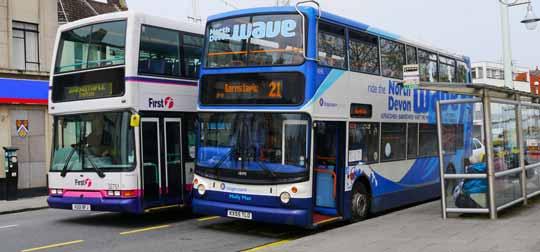
RMTmembers will have witnessed a steady increase in activity around the Royal Fleet Auxiliary, the civilian fleet that provides vital logistical and operational support to the armed forces.
This was highlighted more than ever in the recent dispute with members standing solid during industrial action in the UK and overseas.
RMT national secretary Darren Procter points out that the union had recognised that it was important to improve in various areas and adapt to change.
“Things can always be improved, or new methods introduced to make us better organised, ballot ready and effective in producing quality arguments for improvement to terms and conditions of employment in negotiations.
“As a union we have increased our presence on vessels, attended apprenticeship training centres, held virtual meetings for all RFA members to attend and put in place an organising committee with representatives from every department, with varying layers of experience to fully capture the views of membership.
“We have engaged with members via surveys about how we can become better organised and listened to feedback about how we can encourage more individuals to become actively involved with the union at RFA,” he said.
Whilst RFA management and government departments sat up and took notice of RMT members taking industrial action due to the clear frustration of members.
The union believes that the RFA had brough the conflict on themselves over several years as RMT had been identifying the improvements being made within the
commercial sector, but no action was taken.
“However, if RMT increased its membership within the RFA then the voice of those who working within it will develop into an organised workforce that is willing to campaign for the improvements it so deserves can win.
“In simple terms if we are negotiating with an employer and have 10 per cent membership density, we are limited in what we can do. However, when our membership density is 80 per cent plus that is a much bigger threat to the employer.
“To ensure that we are a threat to the employer we must be organised.
“It is a testament to your convenor Ian Parkin who has put a clear focus on our direction of travel at RFA
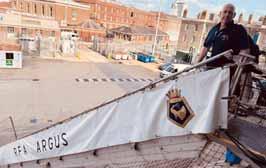
through improved organising and engagement.
“Our focus as a union is to be better organised than ever before, but what does better organised look like, why do we need to better organised, and how can we become better organised?
“Being better organised would mean that we have reps
on every ship from various departments working together, as opposed to leaving it down to one individual because they were onboard first.
“We must ensure that we are having monthly shipboard meetings discussing key issues, identifying what is important to members onboard that vessel and cross
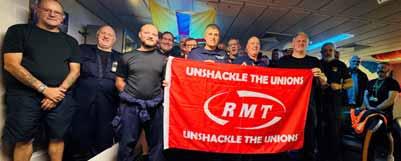
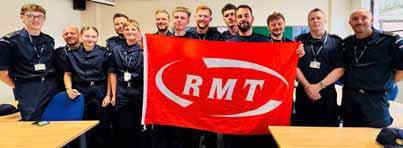
referencing if the issue is isolated to a particular vessel or a fleet wide issue,” he said.
He said that ultimately issues of concern must be escalated to the union and to be effective at doing this the union must ensure that all reps are provided with the necessary training provided through the union’s education system and are supported by branch, regional and national officials as well as head office staff.
“We must be pro-actively engaged onboard so that members are fully aware of terms and conditions of employment, policies, procedures and that we are clear on what the priorities of our membership are.
“No matter how long you have been a union member, no matter how long you have worked for the RFA, whatever department you work in, you can help RMT become more organised in your workplace, because you are the union,” he said.
RMT national secretary
Darren Procter visited members on board the British Antarctic Survey vessel, Sir David Attenborough whilst in dock at Harwich port.
This new ship is fully equipped with the latest instrumentation for the purposes of carrying out
research in polar regions and has an improved icebreaking capability and greater endurance in hostile conditions.
The ship is about 410 foot long, with a beam of about 79 foot, and accommodation is provided for 30 crew and 60 research staff.
“Visiting members on deep
sea vessels is a priority when entering UK ports and we discussed pay, and several key issues were identified during the meeting which we will take up with the employer.
“Having visibility and presence onboard is vital to the work of the union,” Darren said.







Show your support for the union.
Go to the RMT webshop on the RMT web site for more details.
Promote your branch, region and the union - call Pellacraft on 01623 636 602 if you have any queries.



200 years ago, on August 3, 1825, at least five unarmed people were shot dead by soldiers at North Sands, Sunderland while attempting to break up a seafarer’s strike.
Three seafarers on the North Sands – Thomas Aird, Richard Wallace, and John Dover – were all shot dead. At least four bystanders, including a 22-year-old shipwright Ralph Creighton and Mary Wilson, a woman in her seventies, were also shot and died of their injuries.
However, the inquest that followed led by a corrupt local judiciary returned a verdict of ‘justifiable homicide’.
To mark the
200th anniversary of the massacre, the North Sands Bicentennial Committee organised a remembrance procession from St Peter’s Church and names of the dead were read out.
RMT general secretary Eddie Dempsey said that the massacre was an early example of brutal suppression against trades unionism and those who work at sea.
“Seafarers came together to protect their rights, their safety and their livelihoods and they were met with deadly force by the state.
“Two hundred years on, we honour their memory, their sacrifice and take heart from
their heroic example into our current and future battles as trade unionists on sea and land,” he said.
Addressing the gathering, RMT national secretary Darren Procter also said that the struggle that took place 200 years ago were around the same issues today within the shipping sector.
“We still have a lack of protection due to flags of convenience vessels and a lack of political will over many years to address the exploitation, poverty pay and health and safety protection within the sector.
“Whilst we remember the dead we should never forget
the actions of employers to break the strike and murder individuals without being held to account by the politicians and government of the day.
“We believe there should be a permanent memorial for the people of Sunderland as a reminder of the tragic events that unfolded on the North shore,” he said.
The massacre occurred during a strike by the Seamen’s Loyal Standard Association (SLSA), an embryonic trade union that was fighting cuts in wages.
Local shipowners attempted to smash the association through the Ship Owners Protecting Society

(SOPS) However, the SLSA had won a legal case against a local shipowner and magistrate John Davidson who had failed to pay workers for fitting out his ship.
Specifically, the 1825 strike was about offloading ballast at sea from unladen boats returning to the port. The SLSA argued that this was dangerous work as vessels could capsize and crews were not paid additional wages.
SLSA members had prevented ships from leaving port the day before the massacre after attempts to negotiate a settlement collapsed.
The SLSA had proposed the strike would end if the shipowners promised to provide work opportunities for union men and pay for offloading ballast at land or sea. The shipowners rejected this proposal, so striking seamen returned to the river on their small coble boats to prevent larger ships from sailing.
The shipowners attempted to break the strike by recruiting non-unionised labour and special constables to get ships out to sea. Initially frustrated, they turned to Davidson who was deeply antagonistic to the SLSA following the outcome of the legal case, where he had lost £200 (approx. £24,000 equivalent today) in legal fees.
At Sunderland harbour, Davidson boarded a steam packet and was joined by least eight soldiers from the 3rd Light Dragoons, under
command of Lieutenant Phillips.
Striking seamen on the river retreated to the stony beach at North Sands. More than 100 people, including women and children, had gathered there by that time. As the steam packet ventured closer to the riverbank, some women in the crowd started throwing stones.
Davidson consulted with Lieutenant Phillips, and the soldiers opened fire. According to a SLSA report soldiers fired into the crowd as if it were targeting practice.
Three died within an hour on the beach, and at least two others died within the next two days. Six were seriously wounded, and the exact number of deaths may never be known. Local people demanded a murder inquest for the dead but the inquests returned verdicts of ‘justifiable homicide’ for the first three deaths and ‘accidental death’ for others.
The funeral procession comprised of of around 1,200 people. Mourners sang and solemnly placed a British flag on the coffins. Criminal court cases followed in October 1825, and eight strikers were imprisoned. Further seamen strikes occurred in 1826 and 1831, but neither had such a bloody ending.
Dr David Gordon Scott from The Open University and lead organiser of the commemorations said that massacre was an event of enormous national
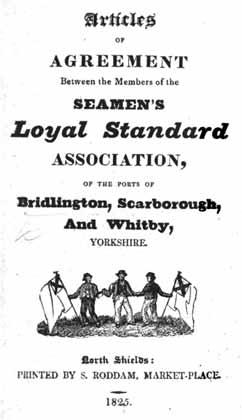
significance in 1825.
“It was reported in newspapers across the country and discussed at the highest political level.
“The people of Sunderland at the time were outraged, believing that innocent people had been murdered by soldiers.
“The sailors’ union purposely referred to the event as the ‘ever to be
remembered 3rd August’ to indicate the magnitude of what happened on that day in Sunderland.
“The 1825 North Sands Massacre should never have been forgotten, but sadly, over time, it has. The people killed, and the other strikers, were fighting for a decent wage and a dignified life,” he said.
In accordance with section 84A of the Trade Union and Labour Relations (Consolidation) Act 1992 RMT is obliged to inform, on an annual basis, any member who joined the union on or after 1 March 2018 that they are entitled to choose to withdraw their contributions to the Union’s Political Fund if they submit a
withdrawal notice. For the avoidance of doubt, the Union does not recommend that you do this as the money it receives from the Political Fund is vital to much of the campaigning work it undertakes.
However, notwithstanding the Union’s position, if you wish to withdraw your contribution to the
Political Fund you need to submit a withdrawal notice making clear you no longer wish to contribute to the Union’s Political Fund. In this notice you should set out who you are, what your address is and what branch you are in. You can submit the withdrawal notice either by delivering it by hand to the Union’s head office
or your branch office or by emailing info@rmt.org. The Union will then action your request. You can also ask us to provide you with an electronic version of a withdrawal notice for you to complete to facilitate your withdrawal and we will do this immediately if you email info@rmt.org.


Nestled beside Didcot Parkway station in Oxfordshire, the Didcot Railway Centre is a 21 acre living museum that vividly brings to life over 180 years of railway history.
The Centre’s busy calendar includes days of running steam and diesel engines, but it is worth a visit when no trains are running such is the scale of the operation.
Housed in the original 1932 Great Western Railway engine shed, it’s operated by the Great Western Society and run largely by dedicated volunteers.
Explore a stunning collection of preserved steam locomotives including 5900 Hinderton Hall, a 1931 Hall Class engine rescued from Barry scrapyard, now on display at Didcot.
The museum showcases relics of GWR life including
brass nameplates, vintage posters, working platforms ticket machines, station china and other ephemera that tell real railway stories.
You can also see restored rolling stock ranging from Victorian-era coaches to 1940s carriages, including the VIP saloon reputedly used by General Eisenhower.
You’ll also encounter freight wagons—from banana vans to gunpowder trucks—illustrating the crucial role of goods traffic.
The Centre also houses
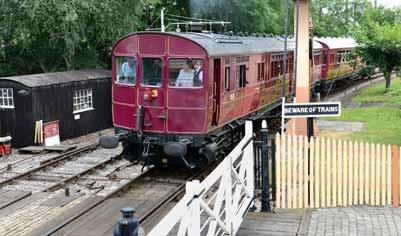

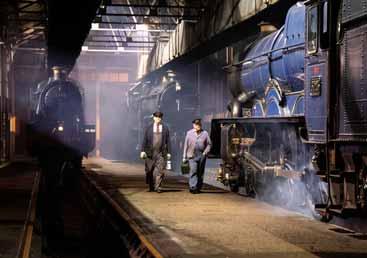
working replicas of Brunel’s early broad gauge locomotives Iron Duke and Fire Fly, plus a preserved pipe segment from his experimental atmospheric system.
The are also hands on experiences at the Signalling Centre, where the Swindon panel is demonstrated on select days. It also contains entertaining and interactive examples of signalling new and old which will delight children of all ages!
Visitors can also descend into a wartime shelter for a
simulated air raid experience reminiscent of WWII railway operations.
Refreshment rooms serve hot meals, snacks, homemade cakes, and drinks. Picnic areas offer views of passing trains and the turntable live area. A gift shop offers souvenirs and railway books.
The centre is actively restoring its fleet and facilities and recently celebrated the centenary of the Pendennis Castle loco which returned to steam after a full overhaul, supported by fundraising events.
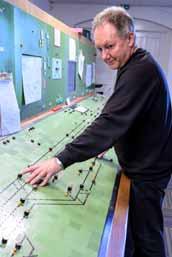
It prides itself on delivering heritage rail events which are educational and engaging for all the family all year round from summer steam galas to Christmas experiences such as a rendition of A Christmas Carol.
From antique locomotives and fascinating memorabilia to live machinery and lively themed events, Didcot Railway Centre is more than a museum—it’s a living journey through the steam age. Perfect for families, history buffs, or anyone with a passion for trains, this treasure
of Great Western heritage offers a uniquely engaging day out in Oxfordshire.
Getting there: The centre is accessible via Didcot Parkway station and reachable by car from M4/A34 with ample parking. Bus services from Oxford and Abingdon stop nearby.
Check the calendar for Steam Days, special events like the Autumn Steam Gala or family-themed weekends.
For more information go to: didcotrailwaycentre.org.uk/
RMT rep and ScotRail conductor Lorna Hunter has earned national recognition after being named Frontline Employee of the Year at a ceremony in Glasgow.
Lorna, who has been a member of ScotRail’s on-train crew at Stirling since 2011, was commended for a Scottish Transport Award for her outstanding commitment to passenger safety and customer service.
In 2024, she was named ScotRail’s Employee of the Month for her brave response to an incident on a quiet late-
night train. When a disruptive passenger became aggressive, Lorna acted swiftly and calmly to protect a vulnerable female customer, helping to ensure the individual was later apprehended by British Transport Police.
Her professionalism and natural empathy shine through in her daily interactions with customers, and Lorna is regularly mentioned on social media by customers who share positive stories and praise her thoughtful approach.
The Scottish Transport Awards recognise excellence,
innovation, and dedication to public service. Lorna said that it meant a lot to be recognised in such a way.
“I just try to treat every customer the way I’d want my own family to be treated, and I’m lucky to work with such a supportive team.
“There are so many brilliant people working on the railway every day, so to be singled out feels really special,” he said.
ScotRail operations director Phil Campbell said that Lorna represented the very best of Scotland’s Railway.
“Her courage, kindness,

and dedication to serving customers with care and professionalism make her an outstanding ambassador for ScotRail,” he said.
An RMT member has secured a £10,000 compensation settlement following a serious workplace accident while employed as a bus driver, reinforcing the union’s commitment to standing up for injured workers.
While returning to the station, the member’s bus was struck with such force that the vehicle lifted and was propelled forward. He suffered multiple injuries and promptly turned to Thompsons Solicitors, the union’s legal partners, to pursue a claim on his behalf.
Liability for the collision was accepted by the driver’s insurers, allowing negotiations to proceed without the need for court proceedings. Thanks to thorough legal representation and union support, a final settlement of £10,000 was reached.
Importantly, as part of the union’s legal promise, the member received the entire amount with no deductions, demonstrating the strength and fairness of union-backed legal services.
This case is a compelling example of how RMT provides more than just representation—it delivers results. From legal expertise to unwavering member support, the union ensures injured workers are not left navigating the claims process alone.
RMT’s legal services continue to uphold the principle that justice should come without compromise — and this member’s outcome is a testament to that.
An RMT member who developed Hand Arm Vibration Syndrome (HAVS) has received a £35,000 settlement from Network Rail.
The member began his railway career with Jarvis Rail, starting as an apprentice. His early years in the job involved extensive and prolonged use of vibratory tools—including Bance drills, disc cutters, Kango packers, rail drills, and impact wrenches—for track maintenance and repairs.
Throughout his 10 years with Jarvis and subsequent years with Network Rail following a TUPE transfer, the member routinely used these tools for three to five hours a day without sufficient information or training on the risks of vibration exposure. Tool monitoring only commenced in 2018, years after his most intense periods of tool use.
In 2016, the member began experiencing symptoms including blanching of fingers, tingling, numbness, and loss of grip strength, particularly in cold weather. Initially misdiagnosed, it was not until
May 2021 that occupational health professionals formally diagnosed his condition as HAVS caused by prolonged exposure to vibratory tools in his work.
Despite increasing pain and symptoms, the member continued working with tools to meet financial obligations, eventually moving into a supervisory role and later transferring to a less physically demanding position in 2024, specifically to avoid returning to tool use.
Following his ordeal, the member instructed workplace injury experts at Thompsons Solicitors to bring a claim for compensation. The case was formally issued and was settled for £35,000 prior to it being listed for trial.
Thompsons Solicitors lawyer Michelle Farrell said that the case showed why it is vital for employers to proactively manage the risk of vibration exposure.
“Our client was not warned about the dangers, nor was his tool use properly monitored for many years. We are pleased that through the union’s legal service, he has now secured compensation that recognises the impact this preventable injury has had on his life”.
Speaking after the settlement, the member said that he was completely
unaware of the risks involved in using these tools for so many hours.
“By the time my condition was diagnosed, the damage was already done. I am grateful to the union and to Thompsons for helping me get justice and financial security so I can now continue working in a role that doesn’t cause me more harm,” he said.
The union has successfully obtained a £5,600 settlement for the wife of a member following her injury in a fall. The incident took place while the member’s wife, a support worker, was returning home from the train station on a dark and rainy evening. She was walking down outdoor concrete stairs in an area cluttered with debris, where the lighting was not functioning.
As she reached the secondto-last step, she slipped on debris and fell onto her hands and knees. The fall left her extremely traumatised and resulted in bruising to both hands and her right knee, as well as an abrasion to her left knee, which has left a scar.
After the incident, the union engaged Thompsons Solicitors to pursue a compensation claim against the company responsible for maintaining the stairs. It was
alleged that the company had breached its legal duty to ensure the staircase was kept reasonably safe.
Liability for the accident was admitted, and a settlement was agreed upon without the need for court proceedings. The member’s wife received the full compensation amount with no
President’s Column
deductions.
Following settlement of her claim, the member’s wife described her experience as “superb” and she could not recommend the team who supported her more.
RMT represented a member who worked as an on-board
chef. Due to a disability, they were unable to continue working on-board in this role. The member requested an office-based role instead.
Occupational Health agreed that the member was fit for such a role. However, the employer had told the member that they could not work in an office position
RMT submitted two vital motions on social justice and safety at work to the annual Trade Union Congress meeting in Brighton.
Decisions taken at Congress matter: they set the tone for how organised labour will respond to the challenges facing working people, their families, and their communities.
Trade unions need to be rooted in those communities to reflect our commitment to defending workers, challenging inequality and building a fairer society.
One motion calls for a fundamental restructuring of the economy to shift wealth and power back in favour of working people. For too long, governments of all shades have accepted self-imposed fiscal rules that prioritise the interests of financial markets over the needs of ordinary people.
This has predictably resulted in cuts to public services, stagnating wages, weak investment and decades of privatisation and austerity.
While some of the government’s recent proposals -such as the Employment Rights Bill and an industrial strategy—are
welcome steps forward, they do not go far enough. Britain’s economy still suffers from chronic underinvestment, offshoring, outsourcing, and the hollowing-out of good, secure jobs. Without real change, the vacuum left by mainstream politics risks being filled by division from the right.
We are calling on the government and the wider trade union movement to back policies that will shift the balance of wealth and power. This must include:
Extending sectoral collective bargaining across the economy, ensuring that every worker, regardless of industry, benefits from fair pay, job security, and the cohesion that trade union values bring.
Delivering and reminding the government of its pledge to have the biggest wave of insourcing in a generation, bringing services back inhouse where they belong, improving quality for the public, and creating decent unionised jobs.
This means building a new generation of publicly owned and supported industries to drive productivity, green transition, and community wealth.
unless he was deemed fit to work at on-board at sea.
The union supported the member in claims of disability discrimination, and the matter was resolved through negotiation between the parties and the member received compensation.
It also means introducing wealth taxes so that those with the broadest shoulders contribute fairly, instead of squeezing working families.
This would strengthen communities, revitalise public services, and ensure that the economy works for working people, not the other way around.
The second RMT motion addresses the safety of transport workers. Far too many of our members face abuse and assaults simply for doing their jobs. Across the transport sector, workers deserve respect and protection—but instead, they are too often on the frontline of public frustration.
Part of the problem lies in the way workers are demonised.
Sections of the media, backed by politicians and employers, routinely portray transport staff taking lawful strike action in derogatory terms. By undermining the legitimacy of workers standing up for their rights, they foster a culture where abuse and attacks are normalised.
That means holding employers accountable for protecting staff, demanding stronger enforcement against

assaults, and challenging the narrative that vilifies transport workers.
We cannot allow lawful trade union action to be used as a pretext for hostility, and we must insist that every worker has the right to dignity and safety at work.
These motions reflect RMT’s vision to defend our members and stand with the wider trade union movement in reshaping society for the benefit of all working people. The fight for economic justice and workplace safety is not ours alone—it is one we share with millions of trade unionists across the country. To succeed we must grow, encourage every worker who is not yet a member to join a union. There is a union for everyone, whatever your job or sector.
We need an economy that works for working people. And we need respect and safety for every worker. With unity, solidarity, and determination, the trade union movement can deliver it.
George Welch
LUFleet branch held a retirement party for long standing RMT rep sister Linda Martin. After 26 years as a member and a large part of that time as a rep, firstly in the Piccadilly & District branch representing all grades and then when she moved into LU’s Test Crew grade she moved into LU Fleet branch.
For her send-off we were joined by reps and members from the branch, London Regional Council and head office, many of who have worked alongside Linda over the years.
Linda has been a leading
light in pretty much everything she’s been involved with. Not just within the union but she also lead the charge to become the first female member of Test Crew staff, a very small group of highly trained Train Ops who travel all over the LU network, operating all kinds of rolling stock from heritage stocks to the very latest prototype tube trains.
As Linda leaves this unique role there are now three women within the Test Crew grades, proof of Linda’s attitude and work that has led to those barriers being broken down.
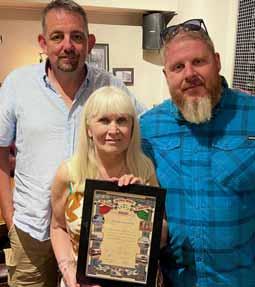
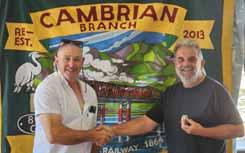
Cambrian
branch chair Alun Thomas presented Paul Wixey with his 25 year service badge at the branch meeting and social in Barmouth in June.

RMT general secretary Eddie Dempsey and Glasgow 5 branch secretary John Hay presented Pauline Callaghan with her 40 year membership award at the retirement party from LNER. Pauline started work on April 29, 1985 in Queen St and transferred to Glasgow Central to work on the West Coast line. She swapped onto the East Coast before privatisation and has worked as train crew with Stagecoach, Virgin and then LNER.

Ateamof RMT
representatives from the Northern Trains Fleet and Engineering grades visited Neville Hill Train Care Centre near Leeds to organise workers there.
A variety of fleets are maintained, serviced and cleaned at this location including Northern Trains new and legacy fleets.
LNER trains are also worked on by Ex EMR engineering staff and cleaners who subject to TUPE transferred into Northern Trains back in 2021.
The council secretary for Fleet and Engineering, Neil Sharples from Wigan branch was joined by service driver council rep Dave McGough and cleaner rep Steve Huddlestone to the Neville Hill depot to engage with current members and recruiting new ones.
“The visit was both successful and productive with
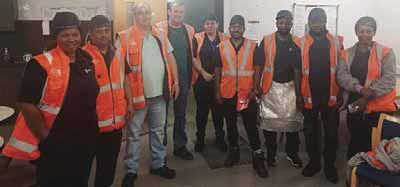
a total of ten new members signing up from the cohort of ex EMR cleaners working on the LNER fleet for Northern Trains,” said Neil Sharples. There is a current wider recruitment campaign being undertaken within Northern Trains with reps and activists are keen to promote RMT within company.
Dear editor,
The AGM report item entitled ‘Fight for peace’ in last month’s issue of RMT News is misleading.
It reads as if there were multiple motions but there was a single motion, which linked important policies such as demanding Britain ends arms exports to Israel with a call to campaign for the withdrawal of all aid to Ukraine — not just military aid, but “financial aid” too.
Several delegates, including myself, opposed the motion primarily on this basis. Whilst there were many elements of the motion delegates supported, the AGM can only vote for or against a motion. Many of us were not prepared to commit our union to campaigning for the withdrawal of all aid to Ukraine.
Readers wouldn’t know it from the report, the motion was not “narrowly backed” by delegates; the vote was tied 27-27, with several abstentions. The motion was carried only because of the president’s casting vote. The report quotes a speech by a delegate in support of the motion which gave a false
One victory has been the signing of a core work agreement that secures and protects the roles and responsibilities of directly employed staff as opposed to the use of third-party contractors.
A guarantee has also been gained from the company that the 450 new trains that are
narrative of events in Ukraine since 2014. Rather than attempting to counter that in limited space here, I will simply urge fellow RMT members to seek out the views of the independent labour movement and left in Ukraine.
Members interested to survey the actual debate can consult the verbatim minutes, and can reach their own conclusions.
In the fortnight following the AGM, at least 139 Ukrainian civilians were killed, and 791 were injured by Russian attacks, according to UN figures. RMT now has a policy which, whilst nominally opposing those attacks, is focused on demanding the Ukrainian people be deprived of the means to defend themselves from them.
Despite the AGM outcome, I and many other RMT members will continue to organise, in personal capacities, to provide solidarity with our Ukrainian brothers and sisters, against both their own ruling class and Russian imperialist conquest.
Daniel Randall
2025 AGM delegate, Bakerloo line branch
currently subject to a procurement process will be serviced and maintained by inhouse Northern Trains workers.
If you are an RMT member employed by Northern Trains and would like to be involved in recruitment and retention activities, please contact: Neil.sharples@outlook.com

RMT’s Bletchley and Northampton branch said farewell to former branch secretary Steve Craddock after 50 years railway service.
Former RMT general secretary Mick Cash made the presentation and thanked Steve for his service to the union.

The RMT London Widows & Orphan Fund (LWOF) was founded in the 1950s, following input from King’s Cross No. 2 and Nine Elms branches, to provide extra financial support to widows and orphans in the London area.
Born an orphan, founder Jim Stevenson knew hardship first-hand. He began his rail career in East Coast Mainline catering and became a strong supporter of the NUR (now RMT) London Widows & Orphan Fund (LWOF), later serving as secretary and chair. As an RMT regional organiser, he remained a committed advocate for LWOF’s mission. Today, the RMT London
and Widows Orphan Fund has grown from a London-based initiative into a national fund, offering widows and orphans across the UK additional financial support to improve their quality of life. After Jim’s Stevenson’s sad passing in 2019, the Fund’s future was uncertain, but the determination of dedicated individuals has ensured its survival.
For further information, contact us at rmtlwof@rmt.org.uk

HELP US MAKE A DIFFERENCE
Support the LWOF with a oneoff or regular branch, regional council, or personal donation to help families in need.
SCAN TO DONATE




RMT has developed a number of benefits to save members money. This includes negotiating access to savings and special offers from our approved partners.
The union has a dedicated team of elected officers and local reps to serve your interests negotiating with employers on issues from pay, hours of work, pensions and working conditions. They are supported by a team of researchers to formulate pay claims to obtain the best negotiated terms for you.
The union has a political fund to run campaigns and provide a political voice to benefit members’ interests in the workplace. RMT has a very active parliamentary group which raises issues of concern for members at Westminster, the Scottish Parliament and Welsh Assembly.
Personal injury claims cover if you suffer an accident in work or outside work. RMT underwrites settlements that would not be provided by no-win, no-fee companies. Call 08457 125 495.
Members who have suffered an industrial disease will receive free legal support to make a claim. Such claims are underwritten by the union and members will not have any deduction from their settlement unlike claims run by no-win, no-fee companies. Call 08457 125 495
Payable if you have an accident at work or on the way to or from work. Accident benefit is only payable if you have been off for three days or more. Accident must be reported to branch secretary within 26 weeks in order to qualify for accident benefit.
Payable to any member who retires over the age of 60 or aged 55 if retired through redundancy or resettlement. Ill health retirement is also payable; proof of this must be sent with application for retirement benefit.
The union can provide a personal taxation service and will preparation service.
Payable to any member who is experiencing loss of wages through being permanently demoted or downgraded as a result of illness or injury. Payment of £300 provided that member reports this to branch secretary within 12 weeks.
Should a member find themselves unfairly dismissed, discriminated against or have any claim which has reasonable prospects of success at an Employment Tribunal, RMT will provide legal representation and pay the fee. Even if the union is advised that the claim is unlikely to succeed, members who make a claim are eligible to receive free legal advice.
The beneficiaries of this fund would be any child of a member or spouse if the member dies in service or if a members’ spouse dies and the member has responsibility of the children. Benefit is paid while a child is in full-time education up until the age of 22. Payment is made quarterly and the rate is £12.00 per week for children up to the age of 16, then £12.75 per week from 16 to 22.
Accessible savings and affordable loans from RMT’s Credit union. www.rmt.org.uk/about/credit -union
Shop online with RMTrewards.com and earn cashback savings from hundreds of retailers, like B&Q, Argos and Tesco. It’s free to join, plus you’ll get a FREE £10 Welcome Bonus in your online account! (Terms and conditions apply) www.rmtrewards.com
if you drive a company vehicle as part of your job you can join the RMT fines pool for £7 per year. The Fines Pool will reimburse members for any speeding fines, related court costs and lost time to attend a court hearing. www.rmt.org.uk/memberbenefits/fines-pool
A Death Grant of £600 is payable to the nearest relative or legal representative if a member dies through any cause prior to retirement.
Fancy cashback on your everyday shopping? Use your RMT Prepaid Plus Cashback card at over 50 partner retailers, including Sainsbury’s, ASDA and Boots, and earn unlimited cashback! It’s different to a credit or debit card - you can only spend what you load so there’s less chance of getting carried away. www.rmtprepaid.com
As a benefit of your RMT membership you can register for £5,000 Free Accidental Death Cover. Cover is for UK residents aged 18-69.12 months free cover.
Annually renewable and always FREE. This policy is underwritten by Stonebridge International Insurance Ltd. www.rmtprotect.com
For a small monthly premium you can claim cash-back on dental, optical and therapy treatments. Visit www.bhsf.co.uk
Assistance for members with their potential employment tribunal claim offered through the RMT’s In-house Legal Department.

